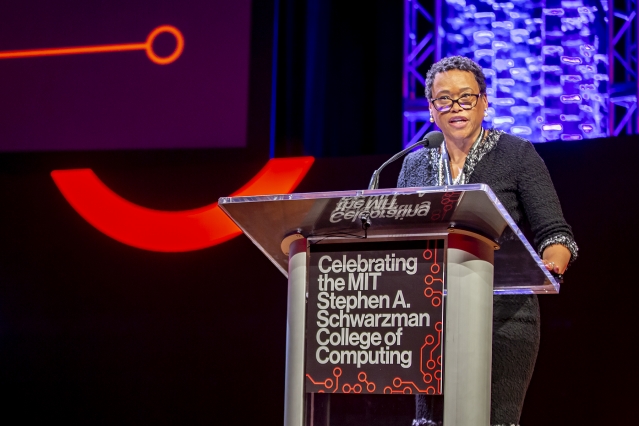Toward the close of the three-day celebration of the MIT Stephen A. Schwarzman College of Computing, there was one inescapable takeaway: “We are at an inflection point.
copyright by news.mit.edu
 Toward the close of the three-day celebration of the MIT Stephen A. Schwarzman College of Computing, there was one inescapable takeaway: “We are at an inflection point. With the progressing technologies of artificial intelligence, we are on the verge of incredible things,” said IBM Executive Vice President John E. Kelly.
Toward the close of the three-day celebration of the MIT Stephen A. Schwarzman College of Computing, there was one inescapable takeaway: “We are at an inflection point. With the progressing technologies of artificial intelligence, we are on the verge of incredible things,” said IBM Executive Vice President John E. Kelly.
Less clear to many participants and audience members after a whirlwind of TED-like talks, demonstrations, and discussion was whether advanced computation can truly work primarily for the benefit of humanity.
“We are undergoing a massive shift that can make the world a better place,” noted David Siegel, chairman of Two Sigma Investments. “But I fear we could move in a direction that is far from an algorithmic utopia.”
Meeting the challenges of artificial intelligence
Many speakers at the three-day celebration, which was held on Feb. 26-28, called for an approach to education, research, and tool-making that combines collective knowledge from the technology, humanities, arts, and social science fields, throwing the double-edged promise of the new machine age into stark relief.
As Melissa Nobles , the Kenan Sahin Dean of MIT’s School of Humanities, Arts, and Social Sciences, introduced the final panel of the celebration, she reinforced the need for such an approach, noting that that the humanities, social sciences, and arts are grappling “with the ways in which computation is changing the world,” and that “technologists themselves must much more deeply understand what they are doing, how they are deeply changing human life.”
The final panel was “Computing for the People: Ethics and AI,” moderated by New York Times columnist Thomas Friedman. In a conversation afterward, Nobles also emphasized that the goal of the new college is to advance computation and to give all students a greater “awareness of the larger political, social context in which we’re all living.” That is the MIT vision for developing “bilinguals” — engineers, scholars, professionals, civic leaders, and policymakers who have both superb technical expertise and an understanding of complex societal issues that is gained from study in the humanities, arts, and social sciences.
Thank you for reading this post, don't forget to subscribe to our AI NAVIGATOR!
The perils of speed and limited perspective
The five panelists on “Computing for the People” — representing industry, academia, government, and philanthropy — contributed particulars to the vision of a society infused with those bilinguals, and attested to the perils posed by an overly-swift integration of advanced computing into all domains of modern existence.
“I think of AI as jetpacks and blindfolds that will send us careening in whatever direction we’re already headed,” said Joi Ito, director of the MIT Media Lab. “It’s going to make us more powerful but not necessarily more wise.” […]
read more – copyright by news.mit.edu


Toward the close of the three-day celebration of the MIT Stephen A. Schwarzman College of Computing, there was one inescapable takeaway: “We are at an inflection point.
copyright by news.mit.edu
Less clear to many participants and audience members after a whirlwind of TED-like talks, demonstrations, and discussion was whether advanced computation can truly work primarily for the benefit of humanity.
“We are undergoing a massive shift that can make the world a better place,” noted David Siegel, chairman of Two Sigma Investments. “But I fear we could move in a direction that is far from an algorithmic utopia.”
Meeting the challenges of artificial intelligence
Many speakers at the three-day celebration, which was held on Feb. 26-28, called for an approach to education, research, and tool-making that combines collective knowledge from the technology, humanities, arts, and social science fields, throwing the double-edged promise of the new machine age into stark relief.
As Melissa Nobles , the Kenan Sahin Dean of MIT’s School of Humanities, Arts, and Social Sciences, introduced the final panel of the celebration, she reinforced the need for such an approach, noting that that the humanities, social sciences, and arts are grappling “with the ways in which computation is changing the world,” and that “technologists themselves must much more deeply understand what they are doing, how they are deeply changing human life.”
The final panel was “Computing for the People: Ethics and AI,” moderated by New York Times columnist Thomas Friedman. In a conversation afterward, Nobles also emphasized that the goal of the new college is to advance computation and to give all students a greater “awareness of the larger political, social context in which we’re all living.” That is the MIT vision for developing “bilinguals” — engineers, scholars, professionals, civic leaders, and policymakers who have both superb technical expertise and an understanding of complex societal issues that is gained from study in the humanities, arts, and social sciences.
Thank you for reading this post, don't forget to subscribe to our AI NAVIGATOR!
The perils of speed and limited perspective
The five panelists on “Computing for the People” — representing industry, academia, government, and philanthropy — contributed particulars to the vision of a society infused with those bilinguals, and attested to the perils posed by an overly-swift integration of advanced computing into all domains of modern existence.
“I think of AI as jetpacks and blindfolds that will send us careening in whatever direction we’re already headed,” said Joi Ito, director of the MIT Media Lab. “It’s going to make us more powerful but not necessarily more wise.” […]
read more – copyright by news.mit.edu
Share this: